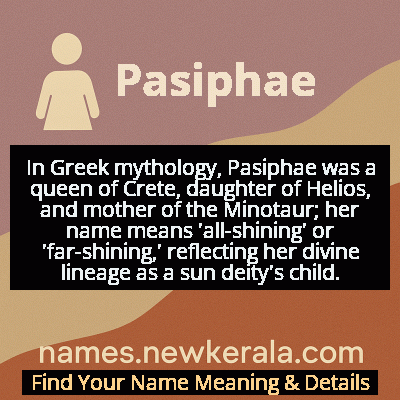Pasiphae Name Meaning & Details
Origin, Popularity, Numerology Analysis & Name Meaning of Pasiphae
Discover the origin, meaning, and cultural significance of the name PASIPHAE. Delve into its historical roots and explore the lasting impact it has had on communities and traditions.
Name
Pasiphae
Gender
Female
Origin
Greek
Lucky Number
3
Meaning of the Name - Pasiphae
In Greek mythology, Pasiphae was a queen of Crete, daughter of Helios, and mother of the Minotaur; her name means 'all-shining' or 'far-shining,' reflecting her divine lineage as a sun deity's child.
Pasiphae - Complete Numerology Analysis
Your Numerology Number
Based on Pythagorean Numerology System
Ruling Planet
Jupiter
Positive Nature
Optimistic, inspirational, and creative.
Negative Traits
Scattered, exaggerating.
Lucky Colours
Yellow, gold, purple.
Lucky Days
Thursday.
Lucky Stones
Yellow sapphire.
Harmony Numbers
1, 2, 9.
Best Suited Professions
Arts, writing, communication.
What People Like About You
Creativity, optimism.
Famous People Named Pasiphae
Pasiphaë of Crete
Mythological Queen
Central figure in Minotaur myth, mother of Ariadne and Phaedra
Pasiphae (Literary Character)
Mythological Figure
Featured in Ovid's Metamorphoses and numerous classical texts
Pasiphae (Astronomical)
Jovian Moon
Irregular moon of Jupiter representing the mythological legacy
Name Variations & International Equivalents
Click on blue names to explore their detailed meanings. Gray names with will be available soon.
Cultural & Historical Significance
Beyond the Minotaur story, Pasiphae was also known as a powerful sorceress in some traditions, capable of poisoning her unfaithful husband's lovers. This dual aspect—both victim of divine machinations and active wielder of magical power—makes her one of the more complex female figures in Greek mythology. Her children include not only the monstrous Minotaur but also the heroic Ariadne and Phaedra, connecting her to multiple mythological cycles. The enduring power of her story has ensured her place in Western cultural consciousness for nearly three millennia, influencing art, literature, and psychological interpretation.
Extended Personality Analysis
The name Pasiphae evokes a personality marked by intensity, complexity, and a certain dangerous allure. Individuals with this name are often perceived as possessing extraordinary determination and willpower, capable of pursuing their desires with single-minded focus regardless of social conventions. Like the mythological queen who defied natural law for her passion, modern Pasiphaes tend to be unconventional thinkers who challenge established norms and boundaries. They often exhibit a fascinating duality—combining intellectual sophistication with raw, primal instincts that can be both creative and destructive.
These individuals typically possess deep emotional currents and passionate natures that can manifest as either profound creativity or overwhelming obsession. Their connection to the name's solar etymology (from Helios, the sun god) suggests personalities that are both illuminating and potentially scorching in their intensity. Pasiphaes often have a magnetic presence that draws others to them, though relationships may be complicated by their complex emotional landscape and resistance to external control. They tend to be fiercely independent, valuing their autonomy above social approval, and often demonstrate remarkable resilience in facing the consequences of their unconventional choices.
Modern Usage & Popularity
In contemporary naming practices, Pasiphae remains an exceptionally rare choice, primarily confined to classical scholars, mythology enthusiasts, and parents seeking highly distinctive mythological names. The name has never appeared in the Social Security Administration's name database for the United States and is similarly absent from popular name charts in other English-speaking countries. Its usage is slightly more common in Greece and Mediterranean regions, though still unusual. The name's challenging mythological associations—particularly the disturbing story of the Minotaur's conception—significantly limit its mainstream appeal. However, it continues to attract those who appreciate its rich mythological heritage, unusual sound, and the powerful, complex female figure it represents. In recent years, there has been a minor resurgence of interest in mythological names, though Pasiphae remains at the more esoteric end of this trend, often chosen by parents with strong classical education or particular interest in feminist reinterpretations of mythological figures.
Symbolic & Spiritual Meanings
Pasiphae embodies profound symbolic meanings centered on transgression, desire, and the monstrous aspects of human nature. Her story represents the dangerous consequences of crossing established boundaries—between human and animal, natural and unnatural, acceptable and forbidden desire. Symbolically, she represents the shadow self that civilization attempts to repress: those primal, unacceptable urges that threaten social order. The Minotaur she births becomes a powerful symbol of the monstrous creations that can emerge from transgressive acts, representing both the terror and fascination of the unknown within ourselves.
Her connection to Helios, the sun god, adds solar symbolism of illumination—but of a dangerous, exposing light that reveals what should remain hidden. This makes her a symbol of forbidden knowledge and the terrifying clarity that can come from pursuing dark truths. The myth also positions her as a symbol of both victimhood and agency—punished by the gods yet actively pursuing her fate. In psychological terms, Pasiphae represents the integration of shadow aspects and the transformative power of embracing one's complete nature, however monstrous it may appear to society. Her story continues to resonate as a metaphor for the creative and destructive potential of unrestrained passion and the complex relationship between civilization and the primal instincts it seeks to control.

